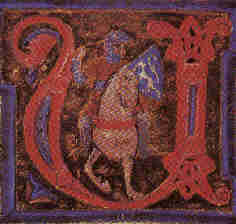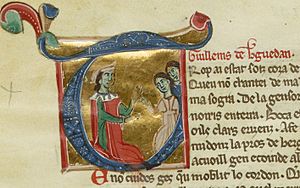Guilhem de Berguedan facts for kids
Guillem de Berguedà (born around 1130, died 1195 or 1196), also known as Guilhem de Berguedan in the Occitan language, was a famous Catalan troubadour. A troubadour was a poet and musician in the Middle Ages who wrote and performed songs, often about love or current events. Guillem was also a viscount of Berguedà, which means he was a noble who ruled over a specific area. He was the most active Catalan poet of his time, even though he wrote in Occitan. We still have thirty-one of his poems today. Most of his poems are called sirventes, which were often about conflicts and reflected his busy and sometimes difficult life. He also wrote a few cansos, which were love songs. Most of what we know about Guillem comes from his vida (a short biography written by others) and his own songs.
Contents
Early Life and Family
The area of Berguedà was a fief, or land held by a noble, under the County of Cerdagne. The first records of this area go back to the 900s. In 1131, Guillem's father, who was also named Guillem, is mentioned in a document. He was paying respect to Huguet de Mataplana, from whom he held land. The troubadour Guillem first appears in documents in 1138, as a child with his father. Later writings show that he had three younger brothers: Raymond, Berengar, and Bernard.
A Troubadour's Turbulent Career
Some of Guillem's poems mention that he was imprisoned before 1175. However, his adult career as a troubadour truly began in 1175. In several of his sirventes, Guillem had spoken badly about Ramon Folc, the viscount of Cardona. This made Ramon Folc his enemy. Ramon, who was a powerful viscount, tried to turn King Alfonso II and his court against Guillem.
On March 3, 1175, a serious conflict occurred between Guillem and Ramon Folc, which resulted in Ramon's death. Because of this event, Guillem's noble titles and lands were taken away, and he was sent away from Catalonia. He was not heard from for seven years. During this time away, he became friends with Arnau de Castellbò and gathered a small group of loyal supporters. It was likely during this period that he went on a pilgrimage to Santiago de Compostela.
Return to Catalonia and Later Years
Guillem's career in Catalonia started again in the 1180s. According to his father's will from 1183, Guillem was set to inherit several castles. These included Madrona (also known as Castell Berguedà), Casserres, Puig-reig, Espinalbet, and Montmajor. He also inherited the land he held from Huguet de Mataplana.
Through some poems by Bertran de Born, who was a friend and fellow troubadour, we know that Guillem was an enemy of King Alfonso II for a time. However, the troubadour and the king seemed to make peace by April 14, 1185. On that date, Guillem was among the king's followers at a meeting with Richard the Lionheart at the Château de Najac. This meeting was held to strengthen their alliance against Raymond VI of Toulouse.

In 1187, Guillem wrote his first will, which we still have today. He left the lands of Fenollet and the castle of Puig-reig to the Templars, a religious military order. He also left a few smaller possessions to the Hospitallers, another religious order. Other than that, everything else went to his brother Berengar. Berengar, in turn, had to give a quarter of it to their brother Bernard. It seems Guillem owed money to the Temple and the Hospital, as they were allowed to keep their inheritances until the debt was paid.
His will helps us understand Guillem's power as a noble. He owned five castles with their knights and loyal followers, along with their territories. He also had various places and estates in upper and lower Berguedà, land in Cerdagne, and rights over Caldes and Sentmenat del Vallès. At the time he wrote this will, he did not have a wife or any recognized children.
Shortly after writing his will, Guillem's relationship with the king became difficult again. This was shown by a mocking sirventes he wrote against King Alfonso. In 1190, Guillem offended the king and the archbishop of Tarragona, Berenguer de Vilademuls. He then wrote a sirventes to his friend Arnau de Castellbò, who was at the court of Alfonso VIII of Castile. At that time, Alfonso VIII was allied with Sancho VI of Navarre against the king of Aragon.
Guillem's final years were spent in wars. He fought alongside Arnau and Ponç de Cabrera against the king, Bishop Arnau de Preixens of Urgell, and Count Ermengol VIII of Urgell.
In 1195, Bertran de Born wrote a song where he expressed regret for his life of arguments and wars. He encouraged Guillem to do the same. However, there was no time for the poem to have an effect. In 1195 or 1196, Guillem was killed by a soldier. This soldier was likely working for one of Guillem's many enemies.
See also
 In Spanish: Guilhem de Berguedan para niños
In Spanish: Guilhem de Berguedan para niños
 | Sharif Bey |
 | Hale Woodruff |
 | Richmond Barthé |
 | Purvis Young |


